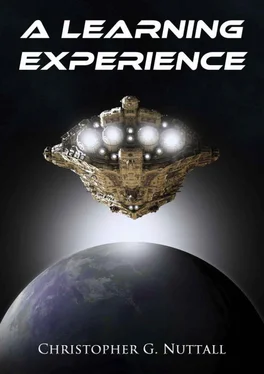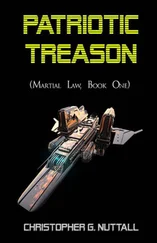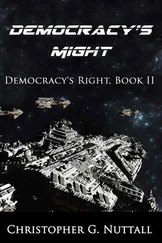Hell, the environmentalists should have gotten behind NASA and pushed , he thought, dryly. Or is it only bad if humans are responsible for environmental change?
The second asteroid had a longer trajectory through the planet’s atmosphere before it finally struck the surface and exploded. Steve watched, staring in awe, as the next few asteroids slammed down in quick succession, each one adding more water droplets to the planet’s atmosphere. Time seemed to slow down as the atmosphere changed, great clouds of dust rising up into the higher levels, then slowly drifting back towards the planet’s surface. The engineers had predicted that, Steve knew, and they’d welcomed it. Dust in the atmosphere would help trap the heat from the explosions.
He heard a cheer as the final impact slammed home, then relaxed. He’d known that nothing could go wrong, yet he’d worried endlessly. Mars wasn’t quite as important, economically, as the asteroids, but humanity needed a new home that wasn’t dependent on life support. If the aliens came calling before Earth was ready… he shook his head, dismissing the thought in irritation. They wouldn’t stand a chance if someone more advanced than the Horde turned up, not for several years. If that happened, Steve’s only real option was to run.
Shadow Warrior could keep a small human population alive for centuries, if necessary. They could make their way to a far distant star system and start again, using the vessel’s technology to rebuild human society. They could make it… but he didn’t want to abandon Earth. It would be the ultimate failure of his long-term plan.
“The spectacular part is over,” he said, as the ripples from the last asteroid slowly faded away. “But, right now, it’s raining on Mars for the first time in eternity.”
He accessed the interface, then displayed the view from the sensors they’d placed on Mars. Droplets of water were falling from the sky and splashing on the ground, then slowly sinking into the planet’s soil. The drones were already deploying the first seeds, seeds that would take root and start producing oxygen as well as bringing life back to the soil. Given ten years, Mars would look green rather than red as the plants spread rapidly. But that would only be the start of the terraforming process.
Smiling, Steve looked towards the members of the Mars Society. They’d drawn up endless plans to colonise Mars, plans that had never been put into action… until now. Steve had seen some of their work and admired it, even though he knew that alien technology and communications would fundamentally change some of their plans. But it would be interesting, he told himself, to see what sort of society developed on Mars.
It will still be decades before proper colonisation can begin , he told himself, as he stepped over to meet them. And by then, the world will have changed beyond all recognition .
“We wanted to thank you in person,” the leader said. Steve hated being mobbed, but the society members didn’t seem to care. “What you’ve done today is remarkable.”
“Thank you,” Steve said. “And your work is pretty impressive too.”
“But not quite in the same league,” the leader said. “When can we begin actually settling the planet?”
Steve shrugged. “When we get more transport organised,” he said. The Americans, Russians and Europeans had started producing spacecraft for the Earth-Mars journey, they just needed to be lifted up into orbit. If some of the ideas about duplicating alien antigravity technology actually worked — and could be done with purely human engineering — the whole process would expand rapidly. “And then you can start organising the first colony mission.”
It would be a more controlled process, he knew, than the plan to settle the asteroids. Mars was a whole planet, after all. And there were more legal issues; technically, settling Mars was also illegal under the Outer Space Treaty. But Steve was not inclined to care about a piece of ill thought out legislation he hadn’t signed… and nor were the other developed countries, now. They were more interested in getting all they could from the lunar settlement and its monopoly on alien technology.
“We look forward to it,” the leader assured him. “And thank you for the space station.”
Steve had to smile. The space station in question was purely human technology — and inflatable, much to his private horror. Combined with a small amount of alien technology, however, it had rapidly proven a viable concept. The Mars Society would be able to maintain a watch on the planet and the automated sensors on the surface indefinitely. But if the Horde decided to use it for target practice, he knew, it wouldn’t stand a chance.
“You’re welcome,” he said. Actually, all he’d done was provide transport. “And I wish you the very best of luck.”
He moved through the compartment, exchanging a few words with each of the people, several of whom had paid through the nose to be allowed to watch from the starship. It still perplexed him that people, even sensible people who had made their own fortunes, were willing to throw so much of it away on a whim, but he’d stopped complaining. If nothing else, it helped fund the endless demands of the lunar colony.
“I’ve got plans to move most of my plants to the moon, if you will have me,” one computer tycoon said. He’d built up several plants over the last few years, trying to ride the cutting edge of computer development. “We think we can use the lunar gravity and the planned stations in space to improve the technology remarkably.”
Steve nodded. It would bring more industry to the moon, which was always important, but it would also allow them to continue researching alien technology. One secret, at least, had already been cracked. It was incredibly difficult to produce a perfect room-temperature superconductor on Earth, but it was quite possible in zero-gravity. It was also possible to produce perfect diamonds, which were likely to cause their own problems. The diamond cartels would probably start hiring assassins when they realised that they were about to be fatally undercut.
Not that we would waste our time on it , he thought. We need the diamonds for industrial processes .
He smiled at the tycoon, then moved on to the next couple of viewers. One of them was an extraordinarily successful romance writer, who was a millionaire despite her books being — in Mariko’s opinion — little more than glorified pornography. Steve had taken a look, purely out of scientific enquiry, and decided the woman was a hack. But she got paid for it, so she must have hundreds upon thousands of fans. Maybe, the cynic in him added, the outfit she wore helped. It was supposed to be a spacesuit, he guessed, but it was so tight that he could see her nipples quite clearly.
“This is quite inspiring,” she gushed, as she took his hand and shook it, firmly. Steve was hard-pressed to place her accent. “I really feel someone could write an extraordinary story on Mars.”
“I’m sure someone could,” Steve agreed, deciding not to mention just how many writers had set books on Mars without actually setting foot on the planet. “Do you plan to move here?”
“I think I will stay on the moon, for now,” the writer said. “It has great atmosphere — and besides” — her face suddenly hardened — “the tax is minimal. And far less confusing.”
Steve couldn’t disagree. Tax forms were one of his pet hates.
“But this is really romantic, in a way,” the writer continued. “Do you think your partner would be interested in an interview?”
“I’m sure she would,” Steve lied. He had barely seen anything of Mariko over the past week, despite the teleporter. She was busy with the medical clinic in New York. “Now, if you will excuse me…”
Читать дальше












